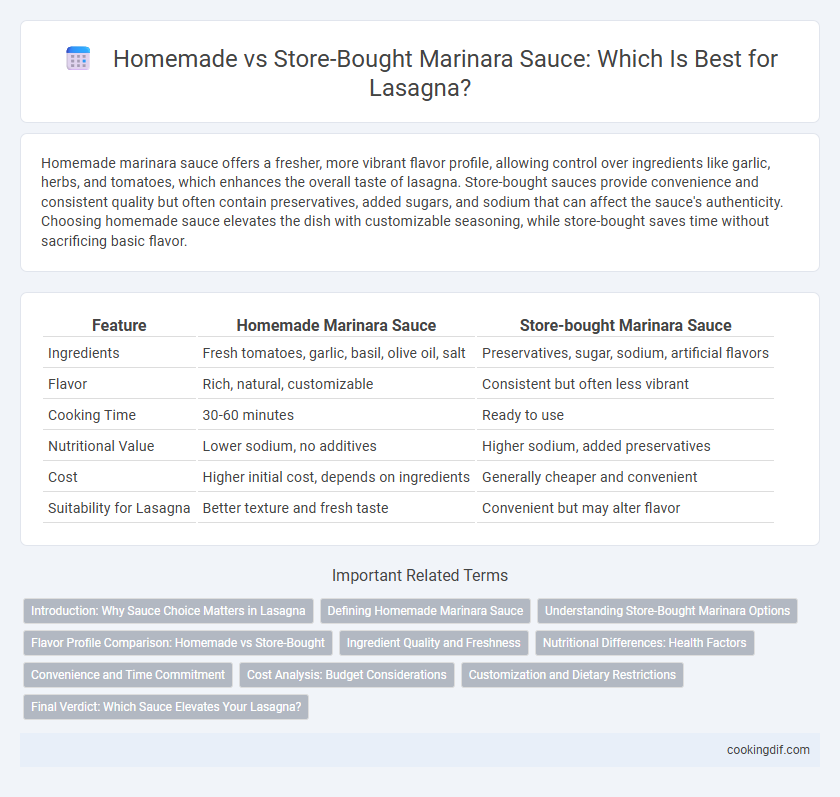Homemade marinara sauce offers a fresher, more vibrant flavor profile, allowing control over ingredients like garlic, herbs, and tomatoes, which enhances the overall taste of lasagna. Store-bought sauces provide convenience and consistent quality but often contain preservatives, added sugars, and sodium that can affect the sauce's authenticity. Choosing homemade sauce elevates the dish with customizable seasoning, while store-bought saves time without sacrificing basic flavor.
Table of Comparison
| Feature | Homemade Marinara Sauce | Store-bought Marinara Sauce |
|---|---|---|
| Ingredients | Fresh tomatoes, garlic, basil, olive oil, salt | Preservatives, sugar, sodium, artificial flavors |
| Flavor | Rich, natural, customizable | Consistent but often less vibrant |
| Cooking Time | 30-60 minutes | Ready to use |
| Nutritional Value | Lower sodium, no additives | Higher sodium, added preservatives |
| Cost | Higher initial cost, depends on ingredients | Generally cheaper and convenient |
| Suitability for Lasagna | Better texture and fresh taste | Convenient but may alter flavor |
Introduction: Why Sauce Choice Matters in Lasagna
Choosing between homemade marinara and store-bought sauce significantly impacts the flavor profile and texture of lasagna. Homemade sauce allows control over ingredients, freshness, and seasoning, enhancing the depth and authenticity of the final dish. Store-bought sauces offer convenience and consistency but may contain preservatives and less balanced flavors that can affect the overall taste experience.
Defining Homemade Marinara Sauce
Homemade marinara sauce consists of fresh tomatoes, garlic, olive oil, and herbs simmered slowly to develop robust flavors and customizable seasoning. Unlike store-bought alternatives, it contains no preservatives, artificial additives, or excessive sodium, offering a richer and more authentic taste. Crafting marinara sauce at home allows control over ingredient quality and texture, enhancing the overall lasagna experience.
Understanding Store-Bought Marinara Options
Store-bought marinara sauces offer a variety of options ranging from organic and low-sodium to those infused with herbs like basil and oregano, catering to different taste preferences and dietary needs. Many brands highlight the use of vine-ripened tomatoes and natural ingredients, providing convenient yet flavorful alternatives to homemade sauce. Understanding labels such as "no added sugar," "gluten-free," and "preservative-free" can help in selecting the best store-bought marinara for an authentic lasagna experience.
Flavor Profile Comparison: Homemade vs Store-Bought
Homemade marinara sauce offers a richer flavor profile with fresher tomato taste, enhanced by freshly minced garlic, basil, and a slow simmering process that allows herbs and spices to meld deeply. Store-bought sauces often contain preservatives and added sugars, which can mask the natural acidity and brightness of tomatoes, resulting in a sweeter and less complex flavor. The ability to customize seasoning and ingredient quality makes homemade sauce superior for achieving authentic, balanced, and robust marinara flavors.
Ingredient Quality and Freshness
Homemade marinara sauce offers superior ingredient quality and freshness by using ripe tomatoes, fresh garlic, basil, and olive oil, ensuring vibrant flavors and no preservatives. Store-bought sauces often contain added sugars, preservatives, and artificial flavors, compromising the natural taste and nutritional value. Choosing homemade sauce enhances the lasagna with authentic freshness and richer, more balanced flavors.
Nutritional Differences: Health Factors
Homemade marinara sauce typically offers superior nutritional benefits compared to store-bought versions due to its fresher ingredients and lack of preservatives or added sugars. It often contains higher levels of vitamins A and C, antioxidants such as lycopene from fresh tomatoes, and healthier fats when made with extra virgin olive oil. In contrast, store-bought sauces may have increased sodium, added sugars, and artificial additives, which can negatively impact heart health and contribute to inflammation.
Convenience and Time Commitment
Homemade marinara sauce offers richer flavors and customization but requires a significant time investment, often needing at least 45 minutes to an hour for simmering and ingredient preparation. Store-bought sauce provides unmatched convenience, allowing for quick assembly in just minutes with consistent taste and no prior cooking skills necessary. Choosing between them depends on prioritizing culinary control and fresh taste versus speed and ease in meal preparation.
Cost Analysis: Budget Considerations
Homemade marinara sauce for lasagna typically costs less per serving than store-bought options, especially when using seasonal tomatoes, garlic, and herbs purchased in bulk. Store-bought sauces often carry a premium due to packaging, branding, and preservatives, raising the overall expense over multiple uses. Considering budget constraints, making sauce from scratch allows greater control over ingredient quality and quantity, optimizing cost-efficiency for frequent lasagna preparation.
Customization and Dietary Restrictions
Homemade marinara sauce allows precise control over ingredients, making it ideal for customizing flavors and accommodating dietary restrictions such as low sodium, gluten-free, or allergen-free options. Store-bought sauces often contain preservatives, added sugars, and sodium, limiting customization and sometimes posing challenges for specific dietary needs. For tailored nutrition and flavor profiles, preparing marinara sauce at home ensures better compliance with personal health goals and taste preferences.
Final Verdict: Which Sauce Elevates Your Lasagna?
Homemade marinara sauce offers a rich, fresh flavor profile crafted from ripe tomatoes, garlic, basil, and a hint of red wine, which deepens the overall taste of lasagna. Store-bought sauces provide convenience but often contain preservatives, added sugars, and less vibrant tomato essence, resulting in a less authentic dining experience. For a truly elevated lasagna, a slow-simmered homemade marinara enhances texture, aroma, and layered flavors, making it the superior choice for culinary quality and satisfaction.
Homemade sauce vs Store-bought sauce for marinara Infographic

 cookingdif.com
cookingdif.com